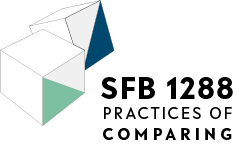This corpus consists of novels published during the Long Eighteenth Century in England. They can be dated to the period between 1680 and 1820. Since the data is representing works from British literature, all authors are either from Great Britain or Ireland. The selected novels are available in .txt format for reading and further analysis.
Collection Process
The list of novels selected for this project, due to the amount, was difficult to complete. There are, of course, several authors that are still known and famous for their written works, like Daniel Defoe, Samuel Richardson or Jane Austen. Secondary literature on novels of the Long Eighteenth Century helped to manage the task at hand, including almanacs and anthologies. Researching the publishing dates and backing up the information, the list of novels grew steadily. The availability of the written works soon turned out to have a focus on the second half of the selected period of time.
Resources
Distribution of Works in the Corpus over Time

Number of Works per Author in the Corpus
| Author Name | Number of Works in the Corpus |
|---|---|
| Jane Austen | 6 |
| Jane Barker | 4 |
| William Beckford | 1 |
| Aphra Behn | 2 |
| Frances Brooke | 3 |
| Henry Brooke | 1 |
| Frances Burney | 3 |
| John Cleland | 1 |
| Mary Cooper | 1 |
| Charles Cotton | 1 |
| Charlotte Dacre | 1 |
| Mary Manley Delarivier | 2 |
| Daniel Defoe | 11 |
| Maria Edgeworth | 5 |
| Henry Fielding | 5 |
| Sarah Fielding | 6 |
| William Godwin | 3 |
| Oliver Goldsmith | 2 |
| Sarah Green | 1 |
| Mary Hays | 1 |
| Eliza Haywood | 5 |
| Charles Henley | 3 |
| Elizabeth Inchbald | 1 |
| Samuel Johnson | 1 |
| Francis Lathom | 11 |
| Charlotte Lennox | 3 |
| Matthew Gregory Lewis | 1 |
| Samuel Madden | 1 |
| Morgan Sydney Owenson | 1 |
| Robert Paltock | 1 |
| Eliza Parsons | 1 |
| Alexander Pope | 1 |
| Jane Porter | 2 |
| Ann Radcliffe | 5 |
| Clara Reeves | 1 |
| Samuel Richardson | 3 |
| Susanna Rowson | 1 |
| Sarah Scott | 1 |
| Charlotte Smith | 1 |
| Tobias Smollett | 6 |
| Eaton Stannard Barrett | 1 |
| Lawrence Sterne | 3 |
| Jonathan Swift | 1 |
| Horace Walpole | 1 |
| Mary Wollstonecraft | 2 |
Workflows
Data Exploration
Due to the processing of the novels, themes, topics and issues can now easily be analysed with the help of computer programmes and tools such as Voyant and AntConc.


![[Open Data]](https://assets.okfn.org/images/ok_buttons/od_80x15_blue.png)